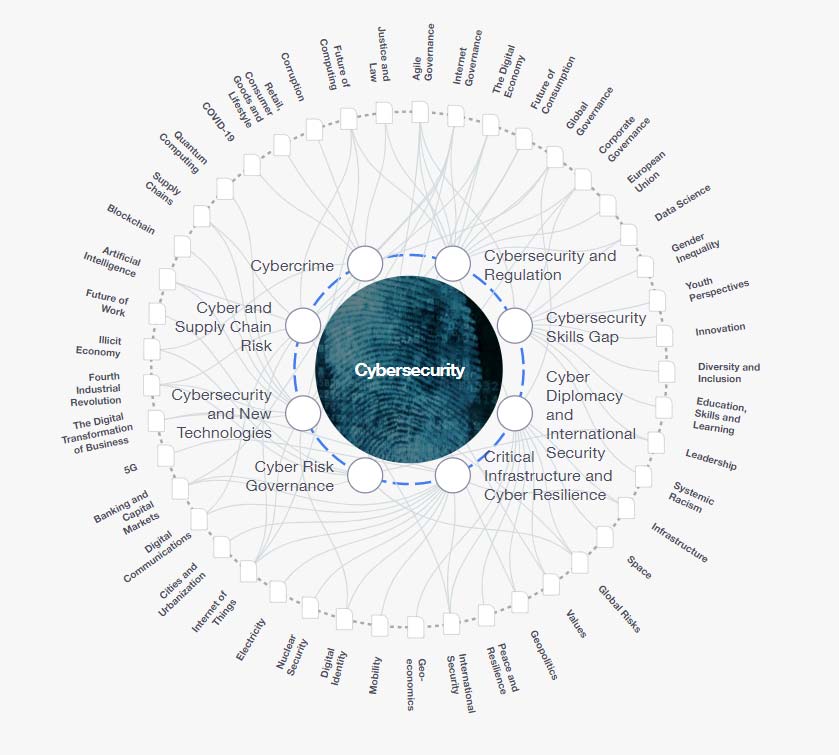As an introduction to Information Security for companies, it is logical that we begin by showing questions of the type that many professionals ask themselves and here at TechnoWikis they will all be resolved clearly and directly:
- What is the level of importance that Computer Security has for companies?
- Is it necessary to carry out good IT Security procedures at the business level from small (SMEs) as is usually done in medium or large companies?
- Is there really a high risk of Cyber threats at the business level?
- Does it have a high cost to suffer cyberattacks or to be protected at a business level?
- Who should be in charge of implementing these Information Security methodologies in companies?
It is already cliché to say that the world in general is dependent (today) on computer technologies and systems for almost all aspects of daily life, in which we need 24/7 connectivity. Not only at the leisure and personal level, but also at the business level. Multiple sectors are becoming more and more dependent, such as businesses (online purchases), banking and finance, communications (RRSS, Chat, Video calls, etc.), training and many more that we are not going to analyze..
How companies manage computer security is an issue that is increasingly on everyone's lips. There is no doubt about the dependence and importance that exists at the business level in daily operations with computer and technological systems, they are enormously vital.
For this reason, we cannot forget and we must take into account their security together with the importance and benefits that we will obtain thanks to having well implemented in our organization (whether large or small) a good management of Cybersecurity with different important tasks to realize that they will be explained in depth in different chapters such as:
- BCP (Business Continuity Plan | Business Continuity Plan).
- DLP (Data Lost Prevention | Data Loss Prevention).
- Cybersecurity incident management. (How it is executed and acts in case of suffering any).
- Training of employees on the importance of Cybersecurity and possible risks to prevent.
- Have detailed who or who are responsible for managing the company's Cybersecurity and their possible Roles.
In this world and digital age, personal data plays a central role. Therefore, it is important to understand that data is much more valuable and much more vulnerable than ever before. It is quite common to hear in the media cases of computer attacks, data breaches and cyber threats that have managed to penetrate important companies and public institutions. But it is also very common for them to be suffered by small and medium-sized companies that must be prepared for this type of event.
In summary: The fact that you have a medium or small company does not exempt you from being the target of attacks of this type. The digital vulnerabilities that a company may have can greatly affect its operations, causing significant losses, a stoppage in its production and daily operations, and even their closure due to not having implemented basic guidelines and protections both before or after suffering any of these types of cyber threats..
Opening the vision and risks a little more, it is important to comment that there is also an increase in geopolitical instability, that is a fact that we are experiencing today. There are several important studies, where cybersecurity is beginning to be given priority because a systemic cybersecurity event could turn upside down not only any company, but also any country.
Companies and organizations depend more than ever on the technical infrastructure that allows connection and communications, so the probability that a simple cyber attack can become a systemic cybersecurity event increases. Being able to knock down in chain many important sectors for the day to day of cities and even countries.
To stay up to date, remember to subscribe to our YouTube channel!
SUBSCRIBE ON YOUTUBE
For example, the World Economic Forum exposes the risks and the importance that should be given to them. We can observe the following table analyzed to take into account on this topic of Cybersecurity and risks that we must face:

Source: Strategic Intelligence WEF: Cybersecurity
A report released between WEF and Accenture called: Global Cybersecurity Outlook 2023, tells us how the world is responding to cyber threats and what leaders can do to protect their organizations. The importance of preparation and concern at a global level in the face of cyber-attacks, which can reach even high systemic scales, is exposed. And without forgetting that large companies or organizations are not the only target of attack as people imagine, small and medium-sized companies are also on a daily basis..
There is currently no doubt that preparing and protecting yourself at a business and personal level in cybersecurity is a very important issue to take into account.
For this reason, taking a Basic Computer Security Course for Companies is more than ever important to be carried out, where the notions will be learned to be able to apply it correctly in the company.
1 What is an Information Security threat and how it can affect business
A cyber security threat is a potentially malicious action that seeks to exploit vulnerabilities in computer systems, devices, networks, connections, etc. A public organization, companies of all kinds of sizes or directly to people may be the targets of this attack.
There are multiple types of cyber threats (computer attacks), but among the most used we can find:
Phishing attacks
Attackers often use emails, impersonating text messages or fraudulent phone calls to deceive employees and obtain information such as their access passwords, financial data, personal data, etc. It is logical that in many cases it is impossible to avoid 100%, but there is no doubt that good training for employees would help to mitigate much of the success of this type of attack.
social engineering attacks
In this case, the attackers manipulate people into revealing confidential information or taking actions that compromise the security of the company without being aware of it and the dimension of the problem they are generating.
malware
Everyone has ever heard of it or experienced it on their own computers on a personal level, and malware is malicious software that can also infiltrate a company's systems to steal information, disrupt the proper functioning of the company, or for other purposes. depending on what the attacker has.
MITM (Man in the Middle) attacks
The attackers intercept the communication and it is manipulated between positioning yourself between two parties, for example: the connection between a user and a website, to steal information or impersonate the identity of one of the parties so that it can later be used by the attacker.
Ransomware
It is a type of malware that encrypts the files and systems of the company, in exchange demanding a ransom, generally in crypto assets (cryptocurrencies such as BTC) due to their lower current traceability and being more international in use. This type of attack has become fashionable in recent years and many companies have experienced it firsthand (large and small) and many continue to suffer daily. If they do not have a control and operational model to stop it, and recover their data, it can be devastating for the activity and survival of the company.
Zero-day vulnerabilities
These attacks have the mission of exploiting unknown vulnerabilities in a company's software or hardware before they are identified and corrected by themselves. In many cases they are rewarded if vulnerabilities are found (and they are warned of their existence).
Supply chain attacks
Cybercriminals in this type of attack compromise a vendor or business partner in order to obtain the information of a target company.
As we said there are many more attacks, but we anticipate these types to give you an idea of what we are facing and why we must protect ourselves at the business level. If we understand this type of attack, not only through those responsible for IT Security areas, but also through the company's own employees (to all departments and C-Suite), we will be able to raise the security level of the same and In many cases, avoid successful attacks in a higher percentage than we imagine.
All these types of cyber threats are aimed at multiple factors that a company can suffer. We assume that you want to imagine or clearly see the real consequences that a company can suffer if it does not take into account protecting its organization from all these attacks.
Attention to the following risks to which we are exposed in business:
Theft of data or damage to the same business

The objective of this type of attack by cybercriminals is basically to be able to obtain business information and access to sensitive company data. They can be of all kinds such as the company's financial information, intellectual property data, customer data, employee data, etc. With what ultimate goal do they do it? It can be to sell or simply expose on the Deep web. Use them for threats, extortion and blackmail towards the company to recover them, etc.
Damage to company reputation

It is not tasteful dish to say on a personal level that one was hacked, imagine for a moment the bad image and reputation that a company can suffer when receiving them. A security breach can damage the reputation of a company, which can lead to a decrease in customer trust towards it, also the loss of active or future business partners, and therefore the reputation of a company is so important because the power to affect a decrease in income by some means or by others is at stake, which we describe as the next point to take into account.
Loss of income (financial) from business activity

A cyberattack that ends up being carried out in a successful company can cause direct economic losses, due to the direct theft of digital assets and funds or the interruption of services, which can greatly affect the daily activity of the company. They can also generate indirect losses, in this case it is due to the loss of customers (due to reputation or long inactivity of the company after having suffered an attack), regulatory fines to which companies are exposed and the possible high costs of recovery of part of the company having suffered them without order and regulation of internal IT Security.
Interruption of the company's operations (internal and/or to clients)

Cyber-attacks, such as the well-known denial-of-service (DDoS) attack, can disrupt a company's services and operations, leading to lost productivity and potentially significant reputational and revenue damage.
Let's think for a moment about the damage that a Streaming-type platform that is widely used today can suffer if they receive a denial of service attack and the costs that the stoppage could generate. They are not the only ones that can be affected, small or medium-sized companies (SMEs) are not spared from this type of attack.
Not only must these types of DDoS attacks be taken into account to generate a possible interruption of the company's service, any attack can generate a stoppage within the company in order to have to protect, solve (restore) and avoid further destruction to digital level. Having greater protection in place and clear operations in the event of an attack will save us many headaches when managing it, in addition to generating less economic loss by being able to restore and lift operations more quickly and effectively.
Recovery costs and return to business normality

Companies must invest in the repair and restoration of compromised systems, the implementation of additional security measures and the recovery of lost or damaged information is key for any company and in many cases they have not taken it into account or have not given it the importance it deserves until they have suffered a cyber attack in their own flesh.
Legal and regulatory consequences | Fines and penalties

Companies may face fines and penalties if they do not comply with laws and regulations related to the protection of personal data and cyber attacks. These laws logically vary according to the country and the jurisdiction of each company. In the European Union, the General Data Protection Regulation (GDPR) is the one that is applied and is one of the strictest internationally. It applies and affects all companies that process personal data of EU residents.
In Latin America there is the Personal Data Protection Law in several countries, such as the Federal Law for the Protection of Personal Data Held by Private Parties in Mexico and the Personal Data Protection Law in Argentina.
The California Consumer Privacy Act, known as the CCPA, gives California residents specific rights related to the privacy of their personal data and applies to companies doing business in California.
There are Data Breach Notification Laws, where many countries and states have laws that require companies to notify authorities and affected individuals in the event of a data breach. Penalties for not complying with these laws vary by jurisdiction and include fines and administrative penalties.
Penalties vary by country and may include fines, administrative and criminal penalties.
Finally, it is important to make it clear that it is much easier to carry out a computer attack on any objective (no matter how large it is) than to have ultra-secure security of it.
Because?
Because no matter how secure you think you have an organization, the attack can always be carried out from the weakest link in the chain. It is very important to have at least some basic computer security rules for companies so as not to leave all doors open, and without forgetting the importance of being protected and well organized to be able to return to operations in case of having to suffer any.
Understanding these different cyber threats and regulating all of this internally will help you protect your business, protect your personal data, and protect your business IT systems that are ultimately vital to your business.
2 Communication between C-Suite and Pro IT: Align Cybersecurity with the strategic objectives of your company
Today, the communication of this type of subject such as Cybersecurity between IT professionals and C-Suite senior management positions (CEO, CMO, CFO, etc.) of companies is more important than ever.
The rapid change that exists in the face of the different risks for the company through new cyberthreats is vital. Being able to effectively communicate these issues between the different areas of the workforce and hierarchies of the organization can prevent many risks to which we are exposed on a daily basis and in many cases without knowing it.
If we want to have effective business cybersecurity, its importance must be perceived at all levels and have it highlighted within the organization, providing its members with the knowledge to be able to avoid a large part of this type of risk.
C-Suite board members and executives aim to manage business goals, get new deals, analytics to add new trending strategies for implementation, improvements in company profitability, getting better financial results and with it keep investors and shareholders happy through dividends etc. They do not usually focus on giving the importance that this IT security forecast point deserves and it is good that it is also placed as an important point that they should give their hand to twist at certain points to facilitate its implementation and as an important feature to take into account. company health account.
On the other hand, IT cybersecurity professionals tend to have a different approach to those of C-Suite, more on the side of having only as sole objectives the technicians that must be carried out to have greater security and to be able to avoid multiple types of cyberthreat risks through that the company faces. On this side, it is important that they also understand the importance of understanding with G-Suite so that the implementation of IT security objectives is aligned with business business objectives. That is why it is important that this type of IT Security Professionals or managers can expose the real commercial impact, income or divisions that may be affected in the company by suffering any type of attack.
Simply by doing this point well, it would be easier for all these Security implementations to take on the importance they deserve and can be understood by all parties, not letting them go unnoticed by the top. That only the most important ones are usually treated on that scale or when a problem has occurred around this.
For everything explained above, everything can be summed up in this: business cybersecurity is not just a technical problem, it is a business and workforce behavior problem. Starting from this point, we can begin to say that the company or organization is beginning to take it into account and will be able to take a strategic position of protection against multiple threats.
It is important to understand and appreciate that training and internal business communication regarding these cybersecurity points are one of the keys to avoiding them, not only are the implementation of robust IT security technology solutions by your department. The behavior of employees when faced with, for example, emails received that seem real but are impersonation attacks, or the use of their personal USBs without any control (which may contain viruses or malware) are examples of some weak points that can affect the activity of the company in a very important way and break it even having strong systems.
IT teams as well as company executives must be interconnected, some focused on security objectives and on the other side, strategies to achieve them effectively, giving it the importance it deserves.
To implement a good interconnection between both areas of the company (C-Suite and Pro IT), these series of recommendations can be taken into account:

Dialogue and commitment between both parties
Having an effective and active dialogue with a commitment between both parties (C-Suite and IT Professionals) regarding this issue of the company's IT Security is a vital point for its implementation to end up being effective and the company can have real IT Security. and updated according to business needs and changes that may occur. In this way it will not become obsolete at the first change and may be effective continuously.
Clear and concise IT professionals with C-Suite
IT Security managers and/or professionals must be able to explain in a clear and easy-to-understand way (without much technicality) both the possible impact that the company may have in the event of a cyberattack and the security goals and objectives to be achieved.
This will help the board understand and support more decisions around cybersecurity. In order to obtain approval of plans of this type by the boards, those responsible for security must also understand the commercial objectives of the company, where its core activity is located, the strategy it carries out for its activity at a digital level and the risks involved in not implementing IT security, and training procedures that can avoid many problems of this type in the face of the different cyberthreats that exist.
C-Suite guiding commercial strategy to Pro IT
On the part of the board and C-Suite executives, they must have proactive communication with IT professionals regarding this issue, being able to give them guidance regarding the business strategy developed by the company so that these professionals can take it into account for the effective implementation of IT issues. business cybersecurity. And above all for the good of the company, value the fact that this IT Security issue is dealt with on its part, applying protection for its commercial areas, customer care and therefore protecting this type of threat that can compromise any company with the importance that this entails for its stability and ordinary growth of the same.
Monitoring reports IT Security
It would be advisable for IT professionals to prepare biannual and annual company IT security reports (depending on size) to company executives that would explain how this important issue is evolving, if the approved security objectives have been achieved. etc This can be used to help the board and C-Suite to see where the security budget is going and the return on investment that the company obtains as a result of its implementation by the department in charge.
3 Importance of training in Cybersecurity at the Business and Personal level
The training and improvement of cybersecurity skills at the business level and also at the personal level, are today one of the most demanded, and will continue to grow due to many factors. We are going to digitize everything in our lives, and the importance of its security and dependence that we have around all of this, takes on vital importance in it.
All this information that we provide in TechnoWikis can be used by many profiles such as the owners of the CEO companies (to understand the importance of security in their companies), the managers and IT professionals of the company (to be able to understand a clear start basic of effective execution of positive rules for the improvement of the IT Security of your company), students and tech professionals who are looking for learning areas of new demand at a global level (it is a complete, interesting and useful information and learning at work level for can be applied in real life of any company of any size) and also the company's employees to train them in the importance of risks to which we are all exposed and can detect.
Let's take into account the paradigm shift that has occurred for multiple companies and how Teleworking has increased the need to value business Security more at a digital level. Today it is normal to have some days of optional teleworking for employees, some companies can offer more days and others less, but it is a reality, that if it is possible to do it due to their type of work, both training and training are necessary today. as security measures well implemented by different companies. At least to lower the potential risk of suffering consequences already exposed above.
As training, cybersecurity is one of the most important areas to take into account in business since it must be applied from employees to managers and managers of the companies themselves.
So, do you think that we have given enough reasons and explanations to continue doing the Basic Course on Computer Security for Companies , on top of that for free with a Certificate? Enjoy this learning path, business cybersecurity is one of the key elements to be able to continue growing without having to experience scares or business deaths for not having taken it into account in this unstoppable acceleration of the Digital age.